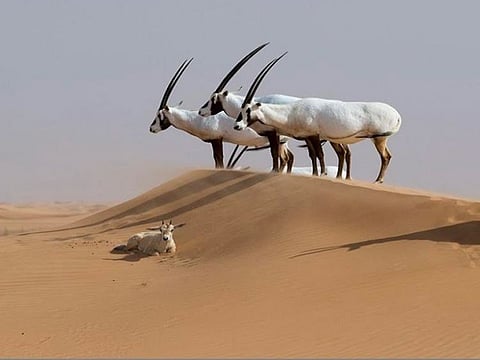How the UAE saved the Arabian Oryx from extinction
Nation now has world’s highest oryx population, at 6,900, thanks to reintroduction project

Abu Dhabi: More than four decades ago, the Arabian oryx was deemed extinct in the wild. But today, thanks to the efforts led by the UAE and a number of Gulf countries, experts point to its swelling numbers as one of the largest environmental conservation success stories in the world.
The oryx has been characteristic of the Arabian desert for thousands of years. But it became a rare breed that was at risk of extinction. The UAE is making every effort to preserve this rare animal, and has established reserves and zoos to care for these animals and preserve their reproduction. Al Ain Zoo is one of the parks that undertook this project.
Reintroduction programme
The Arabian Oryx reintroduction efforts and conservation programmes undertaken by Al Ain Zoo have led to a population of more than 300 Arabian Oryx.
The Arabian Oryx does not have many natural predators, but one species is nearly extinct as uncontrolled hunting has led to the extinction of the Arabian Oryx, which was once widely distributed throughout the Arabian Peninsula, in the wild. The last remaining wild animal is believed to have been shot in Oman in 1972. As the threat of oryx extinction became clear, some of the last remaining animals were captured to form a herd whose offspring could be preserved and reintroduced into the wild.
Since establishing the Arabian Oryx collection at Al Ain Zoo 47 years ago, the zoo has implemented numerous development and conservation initiatives designed specifically for this species. Various improvements have been made in various aspects of the management of the Arabian Oryx, with the aim of enhancing their welfare, standardising breeding management, and harmonising veterinary management practices with international standards.
The zoo has also donated more than 100 Arabian Oryx for local and regional reintroduction projects and performing comprehensive DNA analysis on the entire herd to enhance and optimise their breeding management.
The zoo conducts exchange projects and genetic studies to assess the genetic value of Arabian Oryx populations. These efforts underscore Al Ain Zoo’s dedication to implementing best practices in managing Arabian Oryx and other species under its care.
The Arabian Oryx holds a key position within the zoo, both as one of its earliest founding animals and as a symbol of the UAE’s Founding Father, the late Sheikh Zayed bin Sultan Al Nahyan’s efforts in preserving the rare species from extinction since the 1970s. In honouring his legacy, Al Ain Zoo aims to continue its commitment to wildlife conservation and preservation for future generations.
After the Arabian Oryx was declared extinct in the 1970s, the late Sheikh Zayed launched a successful conservation programme which is now applauded globally. The UAE is now home to the largest population of Arabian Oryx in the world, numbering more than 6,900.
Characteristics of the Arabian Oryx
The Arabian Oryx is a medium-sized mammal weighing up to 80kg. Their colouration is white with darker facial and leg markings. Their horns are very long and straight or slightly curved with male horns thicker and shorter than those of females. They have broad hooves which facilitate their movement on soft sand.
The Arabian or white oryx (Oryx leucoryx) is a large species of antelope endemic to the Arabian Peninsula. These mammals feature heavily in Arabic poetry and paintings. Known locally as the oryx, the Arabian oryx is uniquely adapted to living in extremely arid environments.
“Nearly threatened”
There are now an estimated 1,220 wild oryx across the Arabian Peninsula, in addition to between 6,000 and 7,000 in semi-captivity. Experts at the International Union for Conservation of Nature revealed that the Arabian oryx could be upgraded another level higher on its list within years, to “nearly threatened”, thanks to regional breeding programmes and reintroduction initiatives in the UAE and some wider Gulf Arab states.



